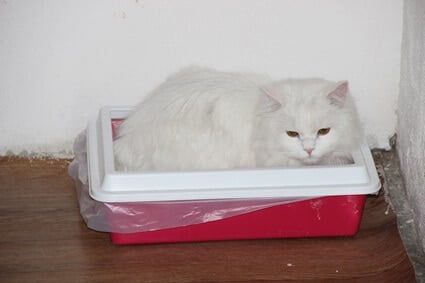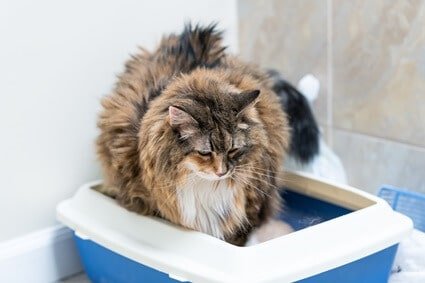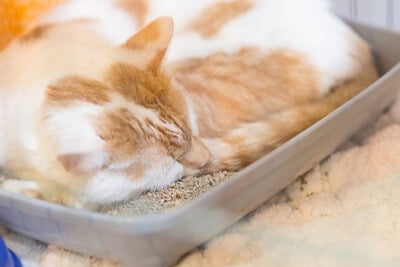Senior cats may begin sleeping in their litter box out of stress or physical ailments. For example, if they feel unsafe, they will seek out a territory that smells like them. Hiding in a box that’s quiet and sees little activity will make the cat feel less vulnerable. Older cats with dementia may get confused and be unable to find their other sleeping spots.
The best way to stop a cat from sleeping in its litter box is to accommodate its needs. Provide a ramp, stairs, or a litter box with a shallower lip if it has mobility issues. Reduce the amount of stress your cat feels by providing it with a safe, hygienic hiding spot. You can also surround it with toys that smell like it, so it doesn’t need to make territory in its box.
You will need to tailor the solution to the unique problem your cat has. If your cat has mobility issues, a UTI, or another ailment, it may be unable to leave the box. If going to the toilet takes too long, it may get tired and sleep there instead. As such, you can surround the box with potty pads to keep things tidy. Letting your cat sleep in the box long-term can expose it, you, and your home to bacteria and disease.
Why Is My Senior Cat Laying In The Litter Box?
Cats are hygienic pets. Most will try to keep their pooping area, eating area, and sleeping area all separate. If your elderly cat suddenly forgoes this to nap in its litter box, you can be sure something is wrong. Whether it’s a physical ailment or a behavioral problem, it may be for the following reasons:
Need To Feel Safe
Hiding in a litter box is a common response for scared cats. This is partly because the cat will be seeking out a protected area that smells like itself.
Cats mark their territory using their urine. The smell of a cat’s urine is different from one cat to another. Its odor is a signal to other cats that they should keep out. Smelling their own urine can be comforting to cats. It proves that this is their home and that no other cat will want to break into it.
Of course, a litter box will smell a little too heavily of their own poop and urine. Cats are still religious groomers, and sitting in their own filth will be unpleasant. If they feel particularly threatened, they’ll take whatever they can get. In lieu of actual territory, cats will go to their litter box.
For an elderly cat that feels unsafe, it’s a good choice. Cats feel particularly vulnerable when they sleep. If your older cat naps here, it’s a clear sign that it’s not just temporarily shaken up. It needs help to feel less unsettled.
Stress
Even if your cat doesn’t feel unsafe, it may feel overwhelmed. Perhaps you brought a new baby home, welcomed in a new roommate, or have plenty of guests. If you’ve got a new pet, redecorated the home, or have construction work nearby, this can all be stressful to a cat.
When it feels overstimulated with new sights, sounds, and creatures, the feline may decide it needs to hide. Litter boxes fit the bill since they are often placed in secluded areas. Not many people will gather or wander nearby, giving the cat privacy.
To top it off, boxes that are equipped with a lid will make a fine hiding spot. If a cat has two (or better yet, three) walls surrounding it, it will feel secure. This is because walls lessen a cat’s blind spots, making it more comfortable.
This is even more true if you’ve moved house. Cats will take a while to adapt to the new layout of their home. Their beds, toys, and play areas may be new or cleaned completely, removing their familiar scent. Litter boxes, however, may still retain a cat’s smell, as urine is hard to wash out. This makes it easier for your feline to locate and enjoy a familiar slice of home.
Urinary Tract Infections
Cats will avoid lying in their own urine. However, a medical condition could leave the feline with no choice. Cats suffering from urinary tract infections may take a very long time to go to the bathroom.
If they get tired or feel they can’t quite pee but still have the urge, they may lie down and appear to sleep. When your cat does this all the time, it can seem like the cat has chosen this place as its new bed.
Urinary tract infections are caused by bacteria entering the urethra, resulting in painful urination. Because cats are known for their excellent grooming habits, they are often resistant to urinary tract infections. However, according to the Journal of Veterinary Internal Medicine, senior cats with pre-existing conditions have a 29% higher chance of developing a UTI. How do you know if your senior cat has a UTI? Symptoms of UTI in cats include:
- Frequent urination, but small amounts of urine
- Straining to urinate
- Crying out while urinating
- Urinating outside of the litter box
- Blood in urine
- Frequently licking the urinary opening
If you think your cat has a UTI, call your vet. It’s a painful condition to live with, and it will not go away without veterinary intervention.

Dementia
Elderly cats, just like people, can get dementia. If your cat is disoriented, it may struggle to remember where its napping spots are. It may also lie down to sleep wherever it is, even in the litter box. If the feline is confused, it can even mistake its litter box as its original sleeping area, regardless of the discomfort.
Feline cognitive dysfunction can be caused by a lack of nutrients and minerals in a cat’s diet. Another cause could be high blood pressure, which senior cats are especially prone to. Cats with dementia will often:
- Wander around the house aimlessly
- Pace without reason
- Vocalize randomly
In extreme cases, cats with dementia may even start to lose their vision, heading, and mobility. If you notice these signs, contact your vet.
Mobility Issues
Senior cats may sleep in their litter box due to mobility issues. The most common reason for this is arthritis, which is especially common in older felines. According to the Journal of the American Veterinary Association, over 90% of cats over 12 years of age showed symptoms of osteoarthritis.
Arthritis refers to the wearing away of the cartilage that cushions the joint. This results in the bones around the joints rubbing against each other. This is very painful as your cat walks, stands, or moves around.
Arthritis can be caused by a normal, expected degeneration of the joints. However, it can also be caused by injury to the joints as this causes the cartilage to wear away faster. Cats with arthritis experience a harder time getting onto surfaces, like:
- Window ledges
- Tables
- Sofas
- Of course, litter boxes
The cat may opt to stay inside the box rather than having to climb out in pain. Some cats may even avoid getting inside the litter box, choosing to do their business in inappropriate places. Symptoms of arthritis in cats include:
- Being reluctant to jump up and down, or use the stairs
- More time sleeping or resting
- Interacting less with owners or other pets
- Less grooming
- Overgrooming of joints
- Dull claws due to lack of sharpening
- Irritable when handled
Cat Sleeping In Litter Box After Surgery
Going through surgery can be a rough time for any cat. No matter the kind of surgery it underwent, you should expect some behavioral changes.
Post-operation cats may be irritable, restless, and overall harder to deal with. They may also begin sleeping in their litter box regularly. This is usually because the cat feels:
- Stressed and unsafe: Whether it’s from the ordeal of going to the vet or the side effects of healing, your cat will be seeking out a hiding place.
- Tired: It can be hard to get in and out of the litter box if your cat feels lethargic or fatigued. It’ll prefer to stay put.
The good news is, this habit should fade as your cat recovers. In the meantime, move your cat to a cleaner area for it to nap. You can also provide a more comfortable hiding place. Putting a cat bed, some toys, and even food underneath your own bed can help the cat feel cozy.
However, contact your vet if you notice your cat straining, yowling, or otherwise taking a long time to do its business. Your post-operation cat may be suffering from intestinal discomfort. This is usually the result of complications from its surgery or the medication it is taking.
Older Cat Sitting In Litter Box
Perhaps your elderly cat doesn’t sleep in the box but instead sits there. In truth, this can mean your cat is having trouble passing waste. This is especially common in older cats that develop intestinal issues. It can be taking longer for the cat to do its business, or it may be in pain and unwilling to move.
Your cat may also be sitting in its litter box as a way to get your attention. It’s trying to signal to you that something is wrong. Perhaps the box needs to be cleaned out, or its toy is stuck nearby.
Is A Cat Resting In Litter Box Bad?
You may think letting the cat take its naps where it pleases is fine. That’s especially true if it has mobility issues and struggles to do anything else. However, it’s important to try and stop this behavior.
Litter boxes are a breeding ground for illness. A cat sleeping in its own litter box is more likely to pick up bacteria and infection. Not to mention, it can also spread germs around the house and onto you.
How Do I Stop My Cat Sleeping In The Litter Box?
Luckily, there are ways to encourage your feline to stop sleeping in its litter box. It may take patience, a new box, or a vet’s intervention, but it can be done.
Make Sure Your Cat Is Healthy
Before trying to change your cat’s litter box habits, it’s important to rule out that your cat is sick. After all, sleeping in a litter box is a common way for felines to show illness. Observe your cat and see if there are any other changes in its behavior. Important symptoms to watch out for are:
- Lethargy
- A lack of appetite
- Sleeping more frequently
- A lack of grooming
If any of these behaviors show up in your cat, contact your vet right away.

Provide Mobility Accommodations
Mobility accommodations are a must for senior cats. This is true even if your cat doesn’t seem to be very troubled with movement.
Cats will instinctively try to hide their pain as much as they can. By providing a few helpful accommodations, your cat will feel better and be less likely to stay in its litter box long-term. Good options include:
- Litter boxes with a shallower lip
- Ramps for the litter box (and other areas of the home)
- Stairs for the litter box, sofas, and beds of your home
- Carpeting on any inclined surfaces so the feline can get a better grip
As a plus, this will also reduce the amount of litter your cat tracks outside of its box. Since it won’t have to struggle to get in and out, it can properly clean its paws before it leaves.
Provide A Better Sleeping Area
Cats that sleep in their litter boxes may be deterred if there are better sleeping options available. Each cat has its own preferences, so it’s a good idea to try out different cat beds.
- Cat mats allow felines to lounge and stretch.
- Enclosed cat beds can help felines snuggle up against the bed’s walls.
- Senior cats appreciate heated beds to help alleviate joint pain.
No matter the style you choose, make sure that your cat’s bed is just the right size. Always keep it clean, especially while your cat is transitioning from sleeping in the litter box.
Lessen Stress
Stress is one of the main reasons for a cat to sleep in its litter box. Try to narrow down what’s upsetting your cat and then remove it (or at least reduce it).
Loud noises, energetic children, or playful kittens are a common source of stress for older cats. In this case, try to give your senior cat its own quiet place where it can hide and rest.
For stress caused by changes in routine, give your older cat time to adjust. Make sure it has extra comfort and attention from you and reduce the number of changes it experiences. For example, do not wash beddings during a move, and place your cat’s items in the same spot as before.


Thank you for all of the helpful information that you provide.